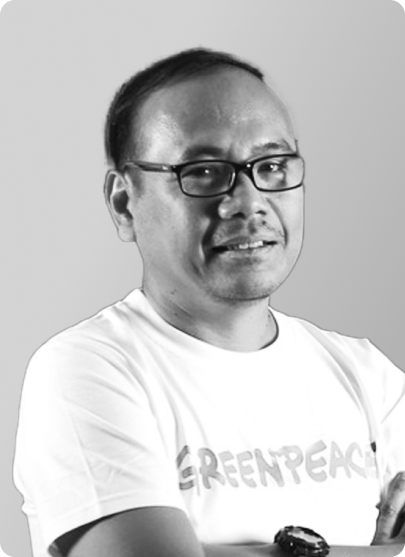
Leonard is a graduate of Bandung Institute of Technology (ITB) as a Bachelor of Petroleum Engineering in 1994. However, he never worked for the petroleum industry. Instead, he dedicated his university years in the student political movement, and also became passionate with the environmental movement.
After graduated from ITB, Leonard worked for Yayasan Pelangi, a national environmental NGO based in Jakarta, and became the manager of Energy Program in Pelangi from 1994 to 1997. During this period, Leo was also involved in the Indonesia Anti Nuclear Society (MANI), the Indonesia-Climate Action Network (I-CAN), as well as the National Mining Advocacy Network (JATAM).
Leonard’s first involvement with Greenpeace was in 1996 when he collaborated with Greenpeace on a study of the potential spread of radioactive impacts of the proposed Muria Nuclear Power Plant, in Java. Since then, Leonard has gone through a diverse work profile that includes working for Oxfam Australia (PIKUL) where he worked on a range of issues: civil and political rights, social and economic rights, indigenous people’s rights to natural resources, mining, food security, disaster preparedness and response, displacement and refugees, conflict and peace building.
During this period he was one of the investigators of the Commission of Enquiry of East Timor Human Rights Violations (KPPHAM Timtim). This investigation eventually led to a set of recommendations that indicted dozens of Indonesian Army (TNI) generals and senior officers, as well as pro- Indonesia militia leaders. In 2001-02 he led Oxfam Australia’s humanitarian response to the religious conflict situation in Poso, Central Sulawesi.
In 2002 Leonard received Chevening Scholarship and went to UK to study Governance and Development in the Institute of Development Studies (IDS), University of Sussex. He graduated in 2003 and holds an MA in Governance and Development. His masters’ dissertation was on politics of corruption in Indonesia.
When he came back to Indonesia in late 2003, he joined IMPARSIAL, a national human rights NGO where his focus of work was on security sector reform. After which, he joined Transparency International Indonesia (TI-I) as its Deputy Executive Director from 2004 to 2005. During this period (December 2004 – August 2005) he also led a humanitarian operation to respond to the Aceh Tsunami disaster, under the auspices of Indonesian Civil Society Coalition (Koalisi Masyarakat Sipil).
In September 2005, Leonard joined NZAID as Development Programme Coordinator, and he would then spend the next nine years to manage international development programmes in Indonesia through different development organisations. From 2007 to 2010 he managed decentralization programmes in UNDP Indonesia, and from 2010 to 2014 as the Unit Manager in AusAID he managed half of AusAID’s decentralization portfolio. During this nine-year period (2005-2014) Leonard worked on decentralization, local governance, poverty reduction, public service reforms, local planning and budgeting, local economic development, and community development.
From June 2014 to March 2016 Leonard worked as Senior Governance Advisor for a UKCCU-funded Low Carbon Development Programme in Papua. This project focused on supporting the implementation of the Papua Provincial Spatial Plan (RTRW Papua) 2013- 2033 considered as the most progressive and pro- environment RTRW in Indonesia.
In 2006, Leonard was one of the founding members of Greenpeace Indonesia and became one of the national board members since then. He joined Greenpeace Southeast Asia, as Country Director for Greenpeace Indonesia since July 2016 until now. Leonard also serves as the Chairman of Supervisory Board of Transparency International Indonesia (TI-I), on voluntary basis. He has been involved as member of the Supervisory Board and Governing Board of TI-I since 2009.
Discussing the importance of media in climate change advocacy and the responsibilities of journalists in informing and influencing the public